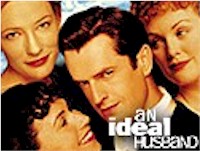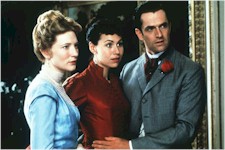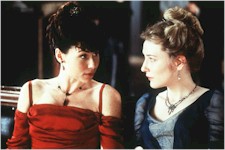|
| |
An Ideal Husband
Review by Gregory Avery
Posted 9 July 1999
 |
|
Directed by Oliver Parker. Starring
Cate Blanchett, Minnie Driver,
Rupert Everett, Julianne Moore, Jeremy Northam,
John Wood and Peter Vaughan.
Written by Parker,
based on the stage play by Oscar Wilde. |
As someone more hipper than I might put it, it's
fin-de-siècle time.
 The appearance
of both An Ideal Husband and David Mamet's new film of The Winslow Boy seems
to signify a yearning for turn-of-the-century Britain, for a time when a gentleman's word
and his honor meant something, when there was a code of manners, propriety, rectitude and
order, and people really knew how to dress and give formal parties. But whereas David
Mamet used the Terence Rattigan play (written in 1946, and previously made into a 1948
film with an excellent performance by Robert Donat) to ironically mirror the state of
affairs at the end of the 20th century -- how events are covered in the media, the
"Balkan crisis" (which, at the start of the century, meant the breakup of the
600-year-old Ottoman Empire), and the wary balance of equality between the sexes -- Oliver
Parker's film of Oscar Wilde's play (written in 1895, the same year as his masterpiece
"The Importance of Being Earnest", which also figures in the plot of Parker's
film) tilts its meaning ever so slightly. The appearance
of both An Ideal Husband and David Mamet's new film of The Winslow Boy seems
to signify a yearning for turn-of-the-century Britain, for a time when a gentleman's word
and his honor meant something, when there was a code of manners, propriety, rectitude and
order, and people really knew how to dress and give formal parties. But whereas David
Mamet used the Terence Rattigan play (written in 1946, and previously made into a 1948
film with an excellent performance by Robert Donat) to ironically mirror the state of
affairs at the end of the 20th century -- how events are covered in the media, the
"Balkan crisis" (which, at the start of the century, meant the breakup of the
600-year-old Ottoman Empire), and the wary balance of equality between the sexes -- Oliver
Parker's film of Oscar Wilde's play (written in 1895, the same year as his masterpiece
"The Importance of Being Earnest", which also figures in the plot of Parker's
film) tilts its meaning ever so slightly.
"...We have married perfect husbands, and we are well punished for it."
"I should have thought it was the husbands who were punished." "Oh, dear
no! They are as happy as possible! And for trusting us, it is tragic how much they trust
us." So say two characters at the beginning of Wilde's play. In the film, the
"ideal husband" is no longer a simply a man of character and deference, and one
who is true in love. He is also an "ideal" man, and an "ideal" by
practice. Sir Robert Chiltern (Jeremy Northam) is forced into supporting a fraudulent
scheme in the British Parliament, lest some compromising information about his past is
made public. Parker includes a scene in the film, which is not in Wilde's play, where Sir
Robert addresses the House of Commons with a speech where he makes a call to "step
unhesitatingly into the next century" while being able to look at the past
"squarely and proudly in the face".
 Northam, who also
played the role of an advocate in Winslow Boy, was a bit more interesting in the
earlier film, where he showed a bit of bladepolish-gleam in his performance, than he is
here, where he must knit his brow and play the anguished man in close-up. A bit more
engaging is Rupert Everett, whose character, Lord Goring, was essentially Wilde's alter
ego in the play ("I don't like principles, father. I prefer prejudices."). Ten
years ago, Everett seemed the epitome of self-absorbed, prettily handsome pop narcissism,
and he was boring as dirt. What a difference ten years makes: he's now turned into one of
the most stylish and adept performers working on the screen, able to turn a line or an
action just the right way in order to get the right emphasis of meaning. And he can be
fiercely charismatic, such as when he leans in towards Minnie Driver's character to look
her in the eyes and express his sincerity. Northam, who also
played the role of an advocate in Winslow Boy, was a bit more interesting in the
earlier film, where he showed a bit of bladepolish-gleam in his performance, than he is
here, where he must knit his brow and play the anguished man in close-up. A bit more
engaging is Rupert Everett, whose character, Lord Goring, was essentially Wilde's alter
ego in the play ("I don't like principles, father. I prefer prejudices."). Ten
years ago, Everett seemed the epitome of self-absorbed, prettily handsome pop narcissism,
and he was boring as dirt. What a difference ten years makes: he's now turned into one of
the most stylish and adept performers working on the screen, able to turn a line or an
action just the right way in order to get the right emphasis of meaning. And he can be
fiercely charismatic, such as when he leans in towards Minnie Driver's character to look
her in the eyes and express his sincerity.
Julianne Moore also conjures up the right note of glittering malice in her role as a
woman who drifts in and out of the beginning of the "London season" (she is last
seen heading off to Vienna, presumably just in time to meet Kaiser Wilhelm). And Cate
Blanchett, showing stunning versatility, is just as convincing, here, playing an
upper-class British wife as she was playing a working class Long Island wife in Pushing
Tin.
Parker has given the film a handsome production, with the action unfolding in rooms
that are chockablock with various styles of furnishings and decorations that have been
tastefully collected from near and far. There are times when you feel like snapping your
fingers to get the actors to pick up the pace of their dialogue a little bit (do the
filmmakers think that we'll miss anything?), and, while trying for champagne
sophistication, the film can sometimes seem dry instead of crisp. Yet, people seem to be
responding to it, even though, as Wilde himself may have put it, placing a man on a
pedestal is the best and surest way to make sure that he falls down with all due rapidity.
Contents | Features | Reviews
| Books | Archives | Store
Copyright © 1999 by Nitrate Productions, Inc. All
Rights Reserved.
| |
|